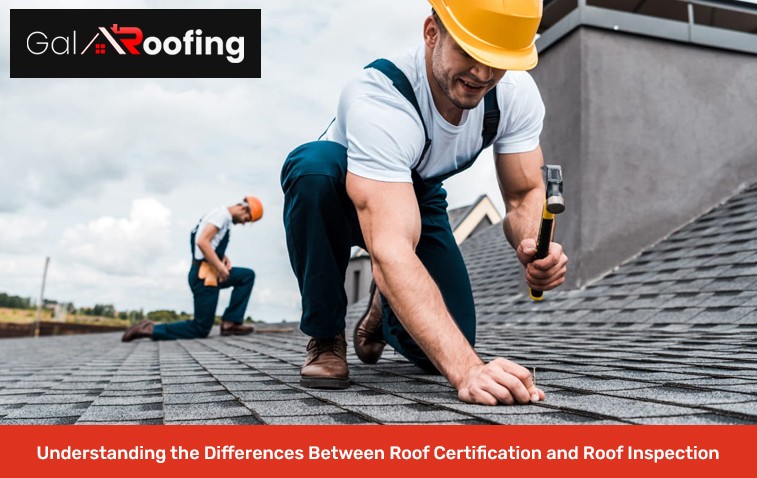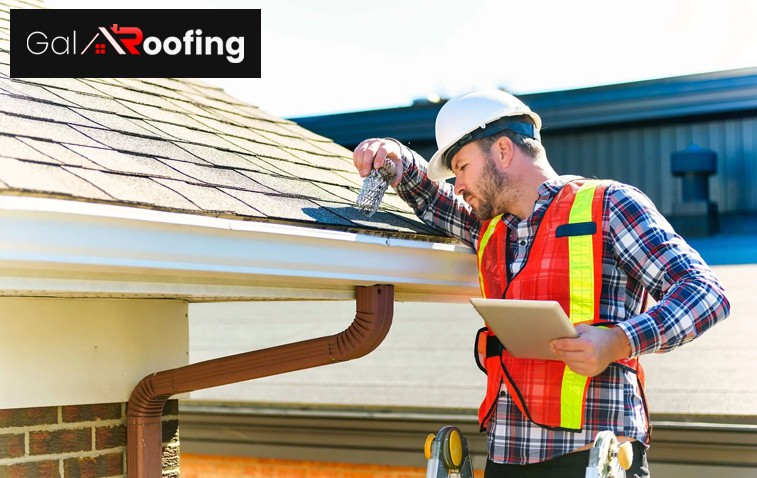Understanding the Differences Between Roof Certification and Roof Inspection
Both roof certification and roof inspection are important for the maintenance and safety of your home’s roof. When you are thinking of selling or buying a home, the importance of both these processes increases. Roof certification indicates that your roof will remain in good condition for a certain period of time. On the other hand, roof inspection analyzes the current condition of the roof in detail.
It is very important to understand the difference between these two processes so that you can properly maintain your home’s roof. Without the right information and understanding, you can make a mistake in choosing one. In this article, we will look in detail at the difference between the two, and how they are important for the safety of your home. Through roof certification and roof inspection, you can get complete information about the exact condition of your roof and its care needs.

Purpose of Roof Certification
The main purpose of roof certification is to ensure that the roof will remain safe and durable for a certain period of time. When a person is selling a home, roof certification is often sought to assure the buyer that the condition of the roof is good. This certificate is usually valid for 2 to 5 years, and it indicates that the roof does not need any major repairs. Without this certification, the buyer or bank may doubt the condition of the roof and may put a condition to repair it.
Roof certification is usually required when a property is being sold, especially if the house is old. Sometimes banks or insurance companies may also ask for roof certification. It also helps in the valuation of the home and provides assurance to the buyer that the roof is safe. If the certification is not there, the buyer may have a chance to question the condition of the roof, which may slow down the property sale process.
Additionally, roof certification helps protect you from potential repair costs in the future. If any problems are found during certification, they are fixed before the certificate is issued. This ensures long-term roof safety and timely maintenance of the home.
Purpose of Roof Inspection
The purpose of a roof inspection is to thoroughly examine the current condition of the roof. This process is more detailed than roof certification. In a roof inspection, every part of the roof is carefully examined to detect potential problems, such as cracks, leaks, or other problems related to the roof structure.
A roof inspection can be done at any time, whether you are selling the home or not. It is different from certification because its purpose is only to check the current condition of the roof, not to guarantee its future safety. The report from the inspection highlights every small and large defect in the roof so that repairs needed can be estimated.
The advantage of a roof inspection is that it gives you an accurate idea of the current condition of the roof. Based on this, you can decide when and where repairs are needed. This helps you take the right steps to protect your home’s roof in the long term. Additionally, it can be part of regular maintenance so that minor problems can be fixed before they turn into major repairs.
What is inspected
There is a lot of difference between the parts inspected in roof certification and roof inspection. The focus and method of both processes is different.
What is looked at in roof certification
Roof certification mainly looks at how durable the roof is and will not need repairs for the next few years. The certification process looks at issues such as the roof structure, quality of materials, and water stagnation on the roof.
It ensures that the roof will not face any serious problems, such as leakage, wear and tear of materials, or structural weakness. If any problems are found, they are repaired before certification to guarantee that the roof will last for years to come.
What is Checked in a Roof Inspection
A roof inspection examines every detail of the roof. It is checked for cracks or leaks, the sealing of the roof is correct, and the condition of the material. The inspection also checks the roof’s drainage system, gutters, and other parts.
The purpose of the inspection is to examine every part of the roof in detail so that even the smallest problems can be detected. This process gives a complete picture of the current condition of the roof, which is important for repairs.
Who does it?
Both roof certification and roof inspection are performed by professionals, but these professionals have different qualifications and certifications.
Who does the roof certification?
Roof certification is performed by people who are licensed and specialize in roofing. These professionals have many years of experience and are adept at inspecting the material and structure of the roof. They make sure that the roof is in good condition and will not need repairs for the next few years.
Professionals for roof certification are specially trained so that they can properly assess the long-term safety of the roof. These professionals not only have technical knowledge, but they also understand the durability and construction quality of the roof.
Who does the roof inspection?
Roof inspection is also performed by licensed professionals, but their expertise is in examining the current condition of the roof. These professionals thoroughly examine the roof structure, material, and drainage. Their purpose is to identify problems and recommend repairs.
Roof inspection professionals ensure that no problem in the roof is left unnoticed. These professionals are technically competent and inspect every part of the roof in detail.
Validity and Duration
Both roof certification and roof inspection have different validity and duration.
Duration of Roof Certification
Roof certification is usually valid for 2 to 5 years. This certificate guarantees that the roof will remain safe till that time and will not require repairs. If any problem occurs between this period, it is fixed as per the certification.
The purpose of roof certification is to provide long-term protection. If there is any major damage to the roof during this period, then repairs are done by the certified professionals. This certification not only provides legal protection but also assures the homeowner that the condition of his roof is safe.
Validity of Roof Inspection
The roof inspection report is valid only till the time it is prepared. This means that the inspection reflects the situation at that time and does not guarantee the future. Inspection should be done at regular intervals, especially after the change of seasons.
It is important to get the roof inspection done from time to time so that the condition of the roof can be constantly checked. This helps the homeowner to know when repairs are needed and what steps should be taken for the long-term protection of the roof.
Legal and Insurance Importance
Both roof certification and roof inspection have special importance in legal and insurance matters.
Legal Importance
When a property is being sold, roof certification is legally important. It assures the buyer about the condition of the roof and makes the sale process easier. On the other hand, roof inspection helps the buyer to know whether the roof needs repair or not.
Roof certification provides legal protection to buyers as it assures them that the roof is in good condition. If the certification is not there, buyers can legally demand the seller to repair the roof.
Importance for insurance
Insurance companies often require roof certification to ensure that the roof is in good condition and does not need repairs. Roof inspection is also important for insurance companies as it gives them information about the current condition of the roof.
If the roof is not in good condition as per the insurance terms, the insurance company may deny any damage claim. Therefore, both roof certification and inspection are important for insurance.

Common problems and reports
Some common problems are found during roof certification and roof inspection that reveal the condition of your roof.
Issues found in roof certification
Roof certification usually checks for water stagnation, cracks, and age of the material. This report shows how strong the roof is and when repairs may be needed. If the roofing material is aging or any weaknesses are found in its structure, these are repaired before certification.
Problems found in a roof inspection
The roof inspection checks for leaks, sealing problems, roof slope, and drainage systems. This report highlights problems that need to be fixed immediately. Many times the inspection finds small cracks or leaks that can lead to bigger problems later on.
Both roof certification and roof inspection are important for the maintenance of your home’s roof. While roof certification gives you information about the future safety of the roof, roof inspection gives you information about its current condition. It is important to understand the difference between the two processes so that you can take proper care of your home’s roof and prevent any problems in the future. Getting certification and inspection done at the right time will not only keep your roof safe, but will also make your home more durable and valuable.